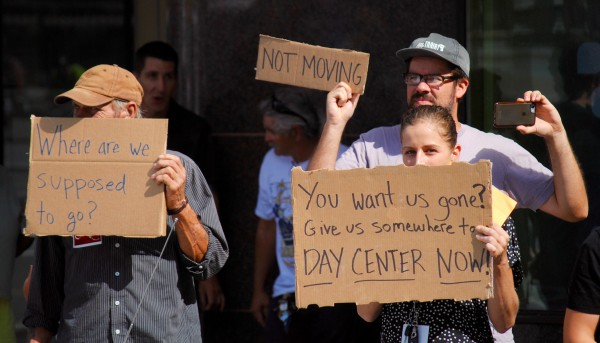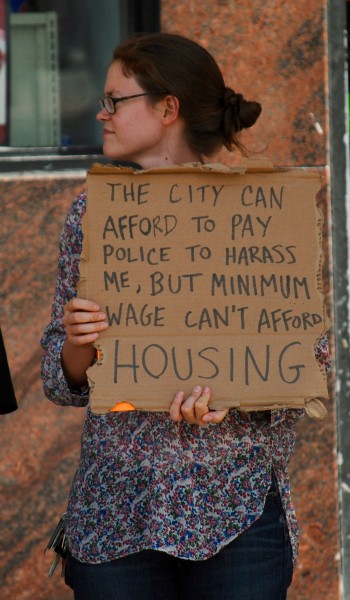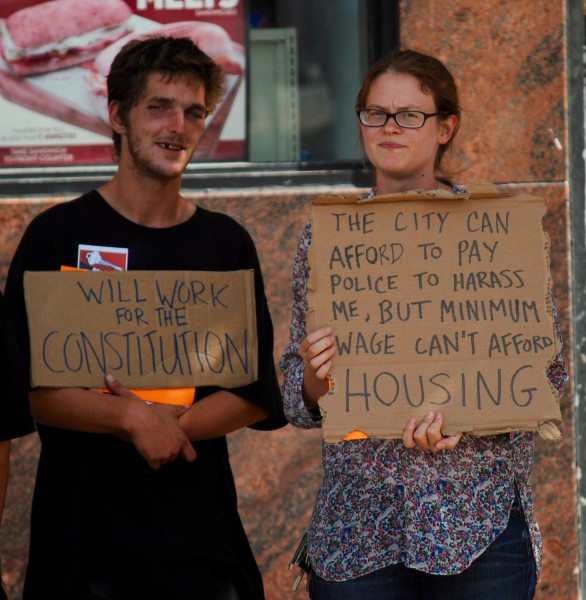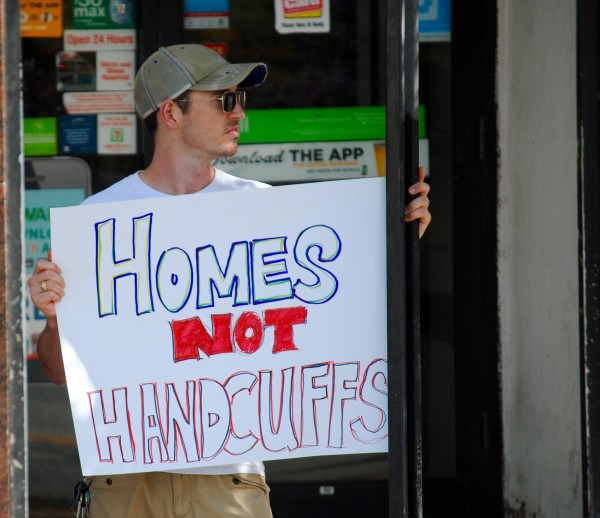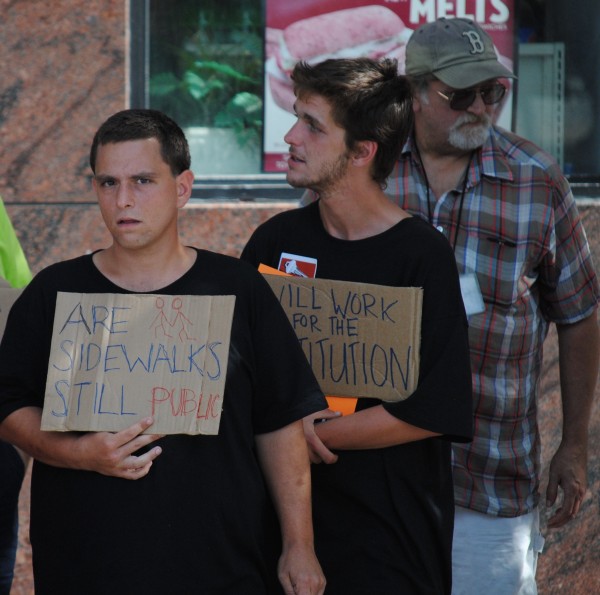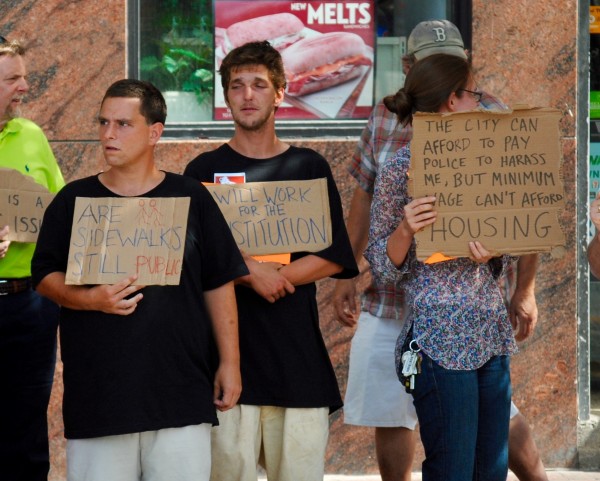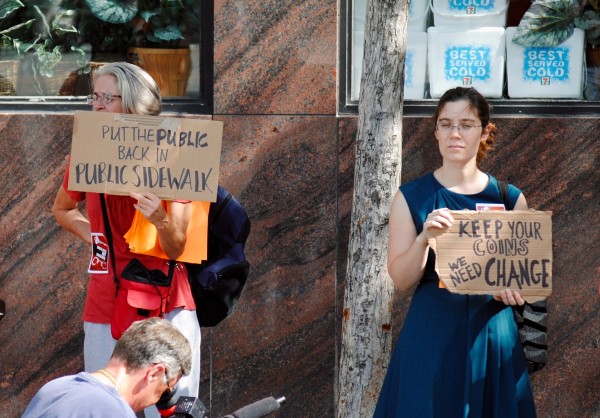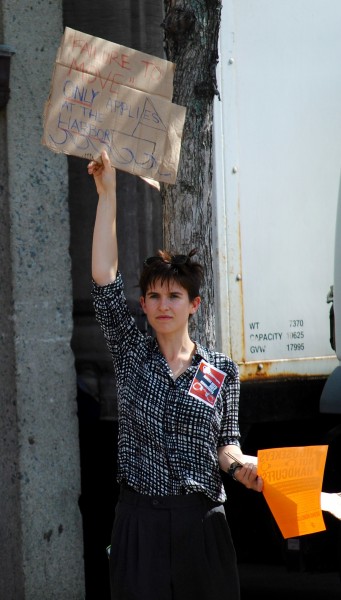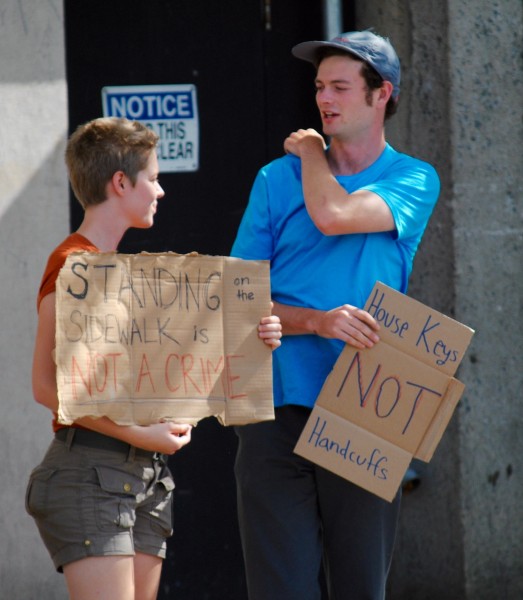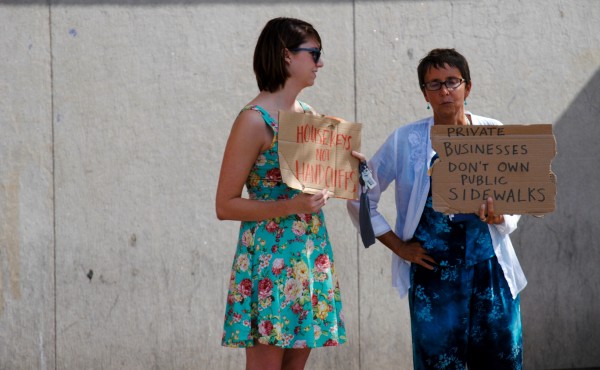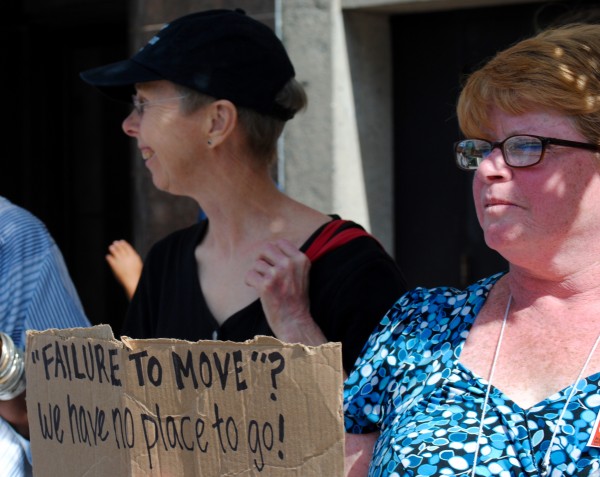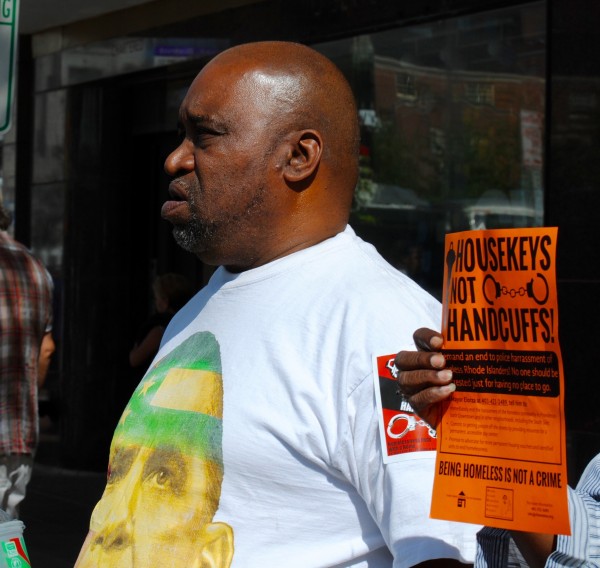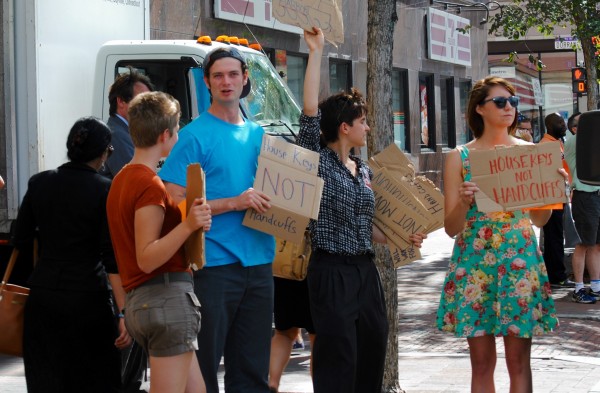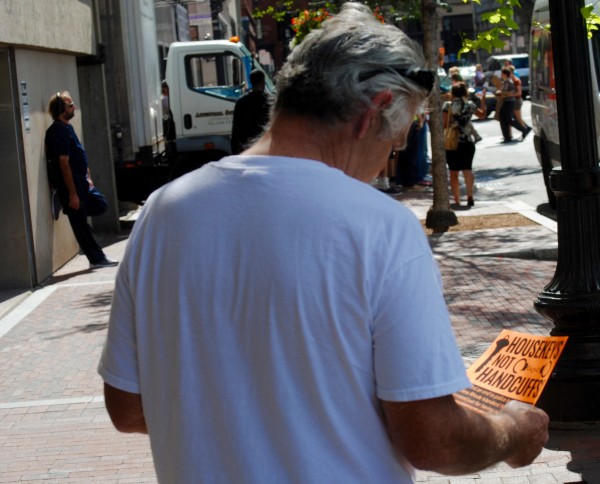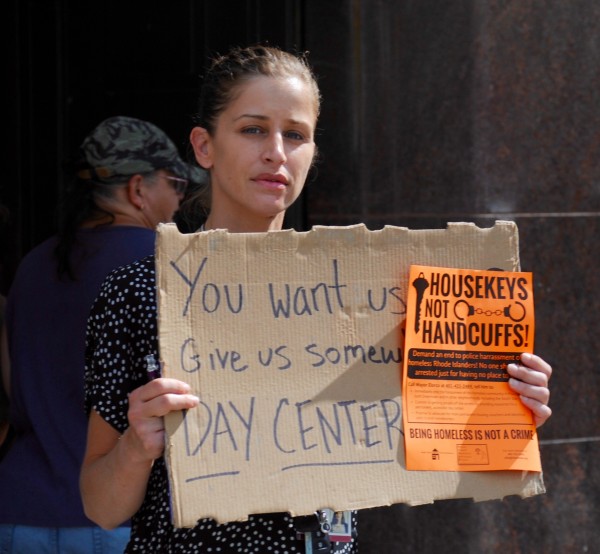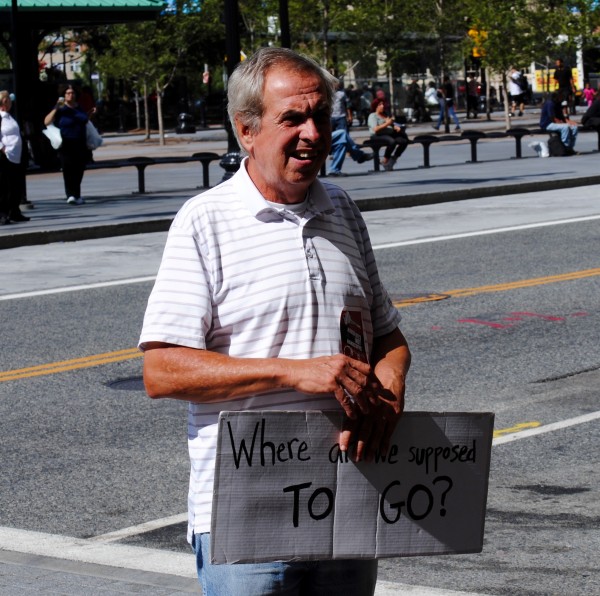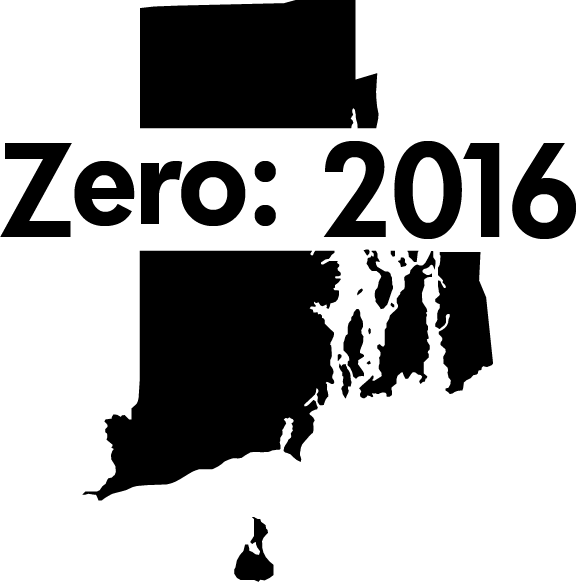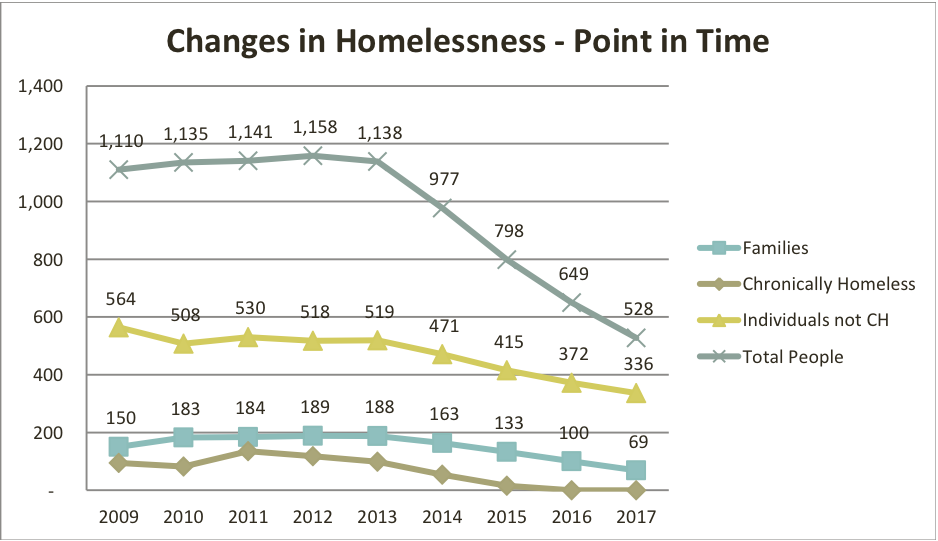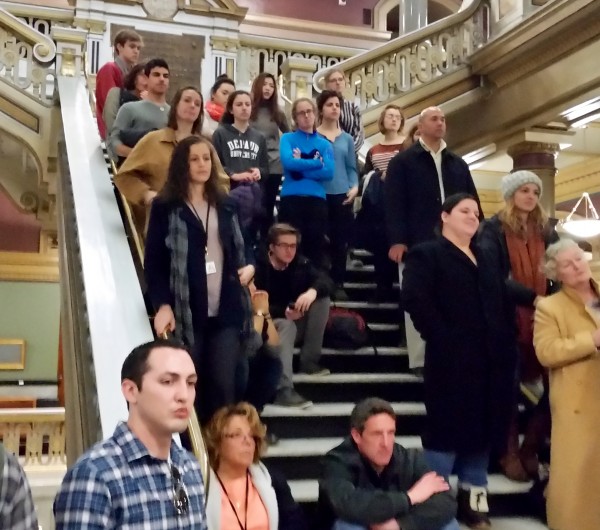 In the rotunda of City Hall advocates for the homeless gathered to release a new study validating the harassment and discrimination being felt on the streets and to demand that Mayor Elorza immediately instruct the Providence Police to stop their practice of criminalizing homelessness and harassing homeless individuals.
In the rotunda of City Hall advocates for the homeless gathered to release a new study validating the harassment and discrimination being felt on the streets and to demand that Mayor Elorza immediately instruct the Providence Police to stop their practice of criminalizing homelessness and harassing homeless individuals.
Back in August 2015, advocates held a rally in front of City Hall protesting the treatment of those experiencing homelessness in the city. They had found that with increasing frequency, people experiencing homelessness were being subjected to judicial and extrajudicial arrest, harassment, and discrimination. Additionally, they contended that individuals who were homeless were being treated as criminals for engaging in activities necessary to survival, foremost among them resting and sleeping.
Soon after the rally, in September, Mayor Jorge Elorza met with the advocates and declared that the harassment and discrimination happening was not in line with his Administration’s policy. At that time advocates asked him to make a public statement expressing that and to focus on solutions to homelessness rather than criminalizing the homeless. Fast-forward to now, four months later, and nothing has come out of the Mayor’s office.
To make matters worse for the Mayor’s office, advocates released results of a public spaces survey which show a clear and disturbing pattern of discrimination against those experiencing homelessness in downtown Providence.
“As an outreach worker I have both heard, and personally witnessed this kind of conduct, and it disgusts and enrages me,” said Megan Smith of House of Hope CDC.
“Essentially, only homeless people and formerly homeless people are being arrested for these activities,” said Dr. Eric Hirsch. The activities include, sitting, panhandling, standing, sleeping and talking, all of which are perfectly legal.
Eileen Boarman was homeless in Providence on and off for over two years. She has personally witnessed and been the victim of police harassment and abuse. She talks of being beaten, spray with water hoses, and having her arm twisted. She was treated as having no value and no rights. Her experiences are impossible to justify.
Several years ago, Providence City Councillor Mary Kay Harris and others spearheaded the creation of the Providence External Review Authority (PERA), a civilian lead police oversight board. In light of Dr. Hirsch’s findings, the re-establishment of this board in a must.
We need, says House of Hope CDC outreach worker Kate Miechkowski, “to address the cause of people having nowhere to go and nowhere to sleep, rather than arresting and harassing those who suffer from the effects of our failed economic policies.”
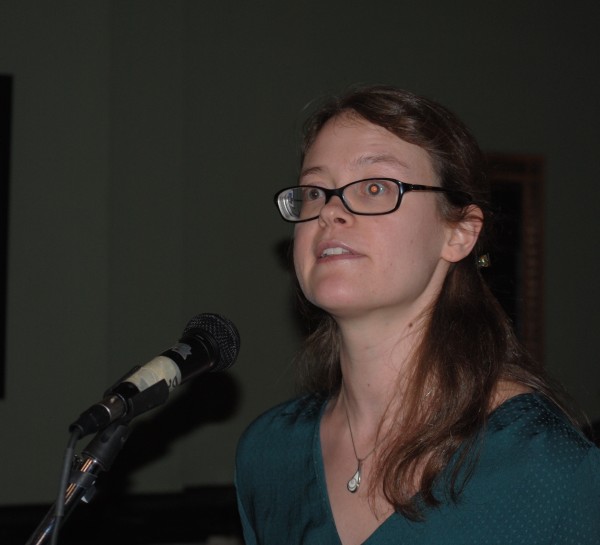
In November, Providence College students conducted a public spaces survey of random pedestrians in the Kennedy Plaza/Burnside Park areas of downtown Providence. The results were striking. Just over half (52%) of those surveyed were homeless or formerly homeless, but 95% of the citations and 94% of the arrests were experienced by homeless and formerly homeless persons.
Answers to other questions on the survey such as whether law enforcement had asked them to “move on” or to leave a particular area, how often they were asked for identification; and how often law enforcement searched their belongings without their permission show the same pattern of disproportionate harassment of homeless and formerly homeless persons by police. Other potential reasons for such targeting such as race, ethnicity, or age were not found to be relevant.

“It was stunning to see the degree to which homeless Rhode Islanders are subject to harassment by the Providence Police Department,” stated Dr. Eric Hirsch, Professor of Sociology and author of the Public Spaces Survey. “It was the only factor relevant to why someone was ticketed or arrested for everyday activities such as sitting, lying down, etc.”

Kate Miechkowski, Outreach Worker for the House of Hope CDC confirmed the findings of the survey stating, “This past summer and fall I had the opportunity to interview dozens of people experiencing homelessness about their interactions with Providence police officers. I was horrified by their experiences of degradation, humiliation, and blatant profiling. There was almost no one I spoke to who had amiable experiences with police officers. I personally witnessed multiple incidents in which people were told that they had to move for doing nothing except occupying a public sidewalk.”
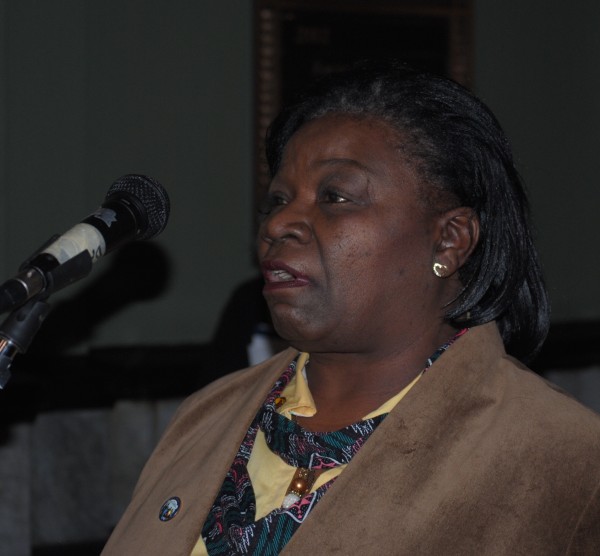
Advocates point to the fact that Rhode Island was the first state in the country to enact a “Homeless Bill of Rights” formally banning discrimination against Rhode Islanders experiencing homelessness and affirming their equal access to housing, employment and public services and believe the police’s targeting of people based on their housing status is illegal.
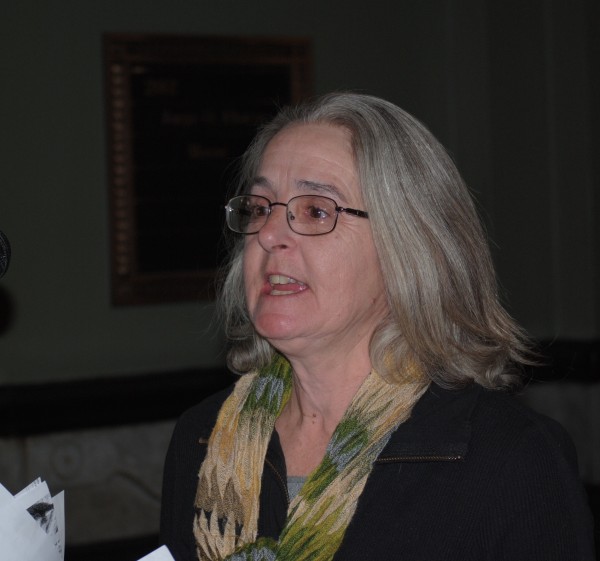
The Rhode Island law asserts that Rhode Islanders experiencing homelessness have the right to use public parks, public transportation and public buildings, “in the same manner as any other person and without discrimination on the basis of his or her housing status.”
In the original letter to the Mayor, advocates stated:
Criminalization is not a solution to homelessness. It is incredibly cruel to those experiencing homelessness, dehumanizing the individuals and making it harder to connect to advocates and services. It also costs the system more by spending taxpayer dollars on court costs and incarcerations rather than on housing, medical care, and other long-term solutions.
The group asked the Mayor to implement the following action steps to address the current situation:
1. Instruct the Providence Police Department that they may not order people to move from public property, nor threaten arrest for the failure to move, absent reasonable suspicion that they are committing a crime.
2. Ensure that this order is followed by:
a. Re-establishing the Providence External Review Authority (PERA);
b. Establishing a designated hotline to report harassment or illegal arrest and regularly reporting on calls received;
c. Adding content on Rhode Island’s Homeless Bill of Rights to the training police cadets receive at the Academy and incorporating this material into re-training of current officers.
3. Provide an appropriate location and budget for a day center in the City.
4. Publicly support the hundred million-dollar bond ask and ensure that the City’s programs to rehabilitate vacant homes (such as Every Home) results in apartments that are affordable to very low income renters.
Nationally, there is increasing recognition of the need for cities to shift away from criminalization and toward a right to housing. In its report No Safe Place, the National Law Center on Homelessness and Poverty details the ways in which criminalizing ordinances are damaging both to individuals experiencing homelessness and to the cities that enact them. It also found that, despite a lack of affordable housing and shelter space, cities across the country are essentially making it illegal to be homeless with laws that outlaw life-sustaining acts, such as eating and sleeping, in public spaces.
Key findings/conclusions from the report are:
- Homeless people are criminally punished for being in public even when they have no other alternatives;
- The criminalization of homelessness is increasing across the country;
- Criminalization laws violate the civil and human rights of homeless people;
- Criminalization laws are costly to taxpayers;
- Criminalization laws are ineffective; and
- Criminalization laws should be replaced with constructive solutions to ending homelessness.
The Seattle University School of Law recently published a series of briefs exploring the monetary costs of criminalization and placing these laws squarely within the shameful tradition of Jim Crow, Anti-Okie, and Ugly laws. Earlier this summer, the U.S. Department of Justice filed a Statement of Interest arguing that it unconstitutionally punishes homelessness to make it a crime for people to sleep in public when there is insufficient shelter.
Rhode Island’s Homeless Bill of Rights stands in complete contrast to this trend causing advocates to be dismayed by the growing complaints from those experiencing homelessness that the police are not respecting their rights.
The Homeless Bill of Rights sets an important foundation for Opening Doors Rhode Island, the state’s plan to end homelessness, which states as a core value that “there are no ‘homeless people,’ but rather people who have lost their homes who deserve to be treated with dignity and respect.”
Opening Doors Rhode Island outlines a plan that significantly transforms the provision of services to Rhode Islanders experiencing homelessness. Consistent with the new federal plan to end homelessness, the plan seeks to sharply decrease the numbers of people experiencing homelessness and the length of time people spend homeless.
“Rhode Island has the potential to be a model for how to end homelessness,” concluded Megan Smith, Outreach Worker for House of Hope CDC. “We can do this by collaborating to provide safe, affordable, permanent housing and engaging with and educating our community. It is not done by harassing and further marginalizing our city’s most vulnerable neighbors.”
Mayor Elorza was invited to speak at the rally, but declined. His office issued the following statement:
“The Mayor is committed to working with our service providers, advocates and community partners to address the social and economic challenges these resident face. We have spoken previously with the Chief of Police and he has directed his officers not to target those who are struggling with homelessness.”
[Portions of this are from a joint RICH and RIHAP press release]

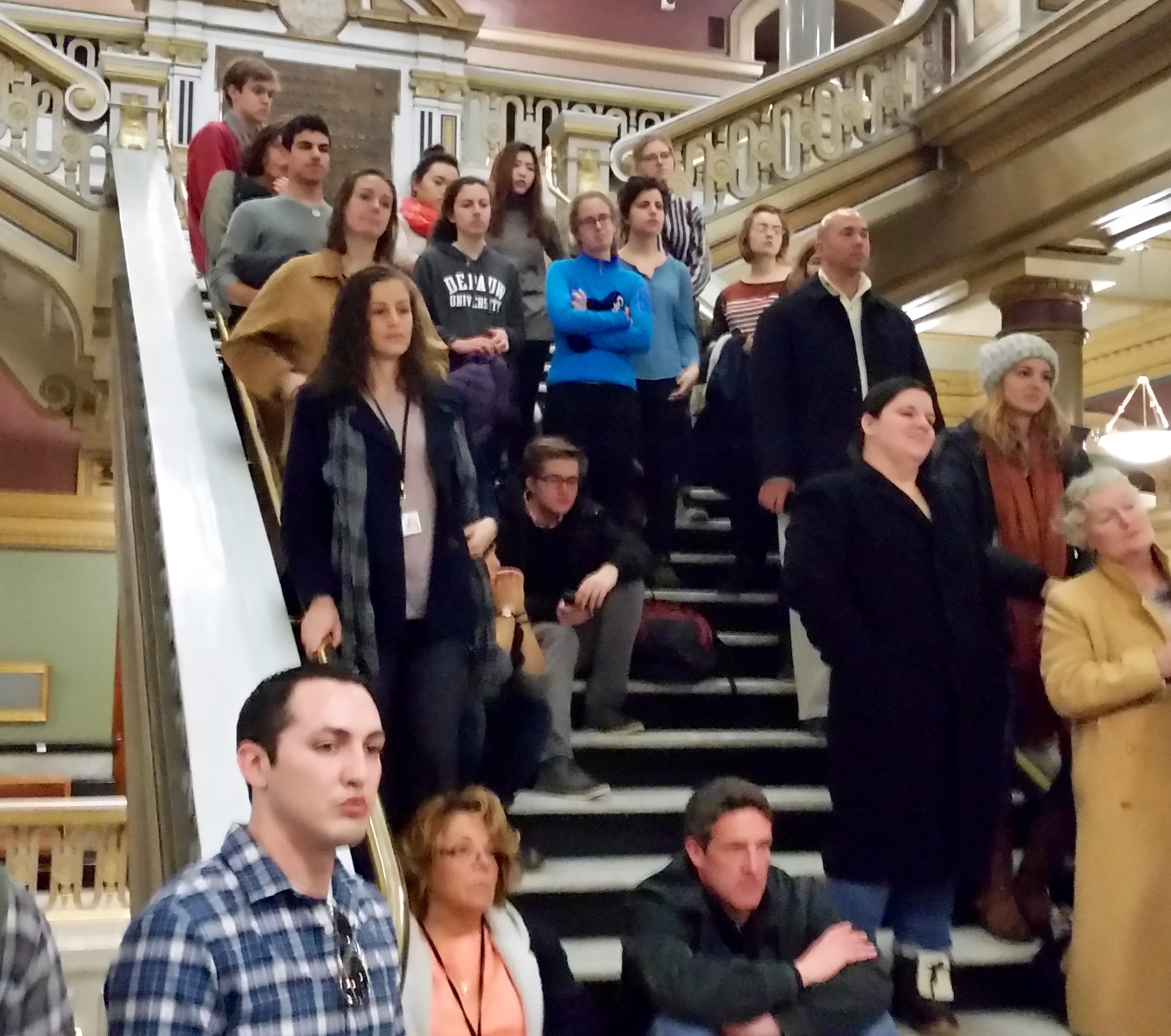

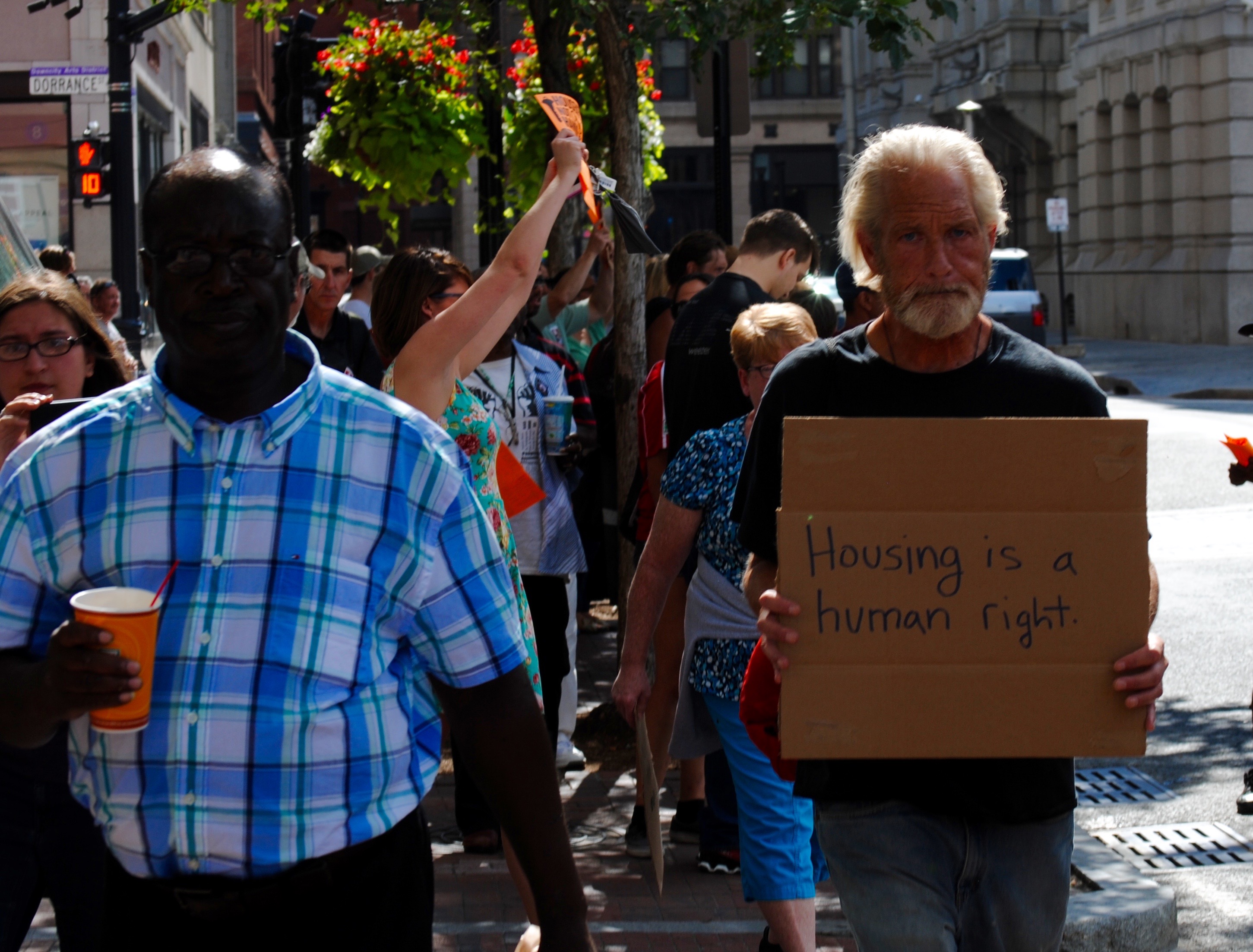
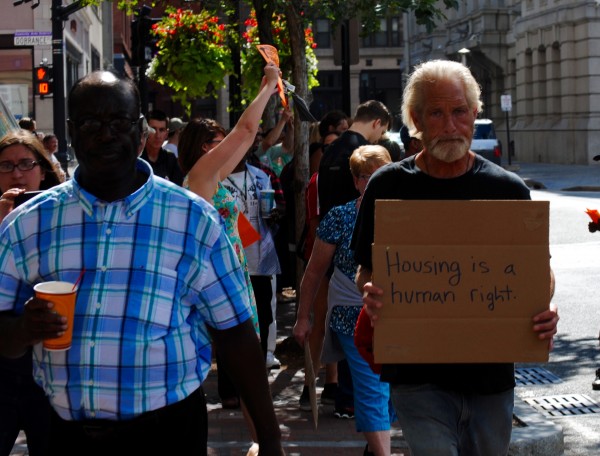 More than 50 homeless and community advocates protested and confronted the police on Thursday afternoon in front of CVS near Kennedy Plaza within sight of Providence City Hall. At least 14 police officers were on hand, though no arrests were made. The protesters carried signs demanding an end to “a noticeable increase of harassment of homeless folks around the city.”
More than 50 homeless and community advocates protested and confronted the police on Thursday afternoon in front of CVS near Kennedy Plaza within sight of Providence City Hall. At least 14 police officers were on hand, though no arrests were made. The protesters carried signs demanding an end to “a noticeable increase of harassment of homeless folks around the city.”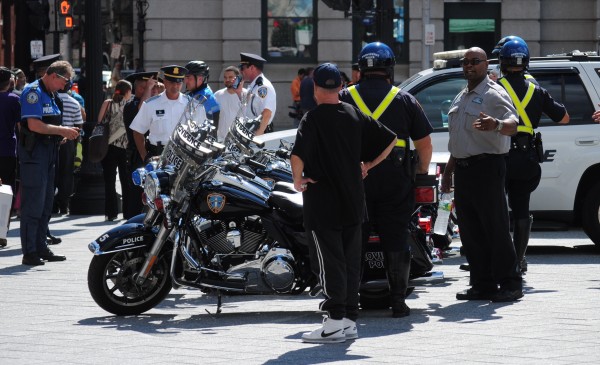 The police officers told Kurland that she was in violation of “failure to move,” a non-existent offense with “no legal basis in city ordinance or state statute,” that is often used to threaten and harass homeless people, according to RICH. When Kurland explained that there was no such law, she was arrested
The police officers told Kurland that she was in violation of “failure to move,” a non-existent offense with “no legal basis in city ordinance or state statute,” that is often used to threaten and harass homeless people, according to RICH. When Kurland explained that there was no such law, she was arrested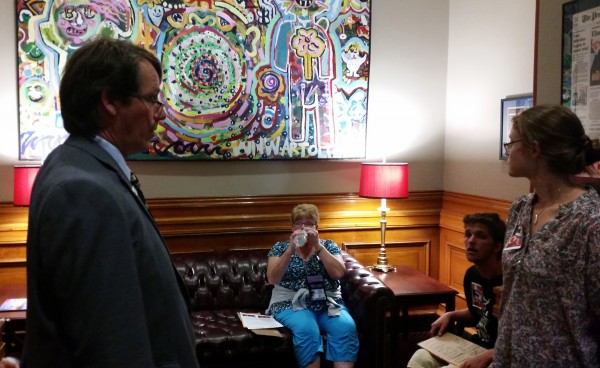
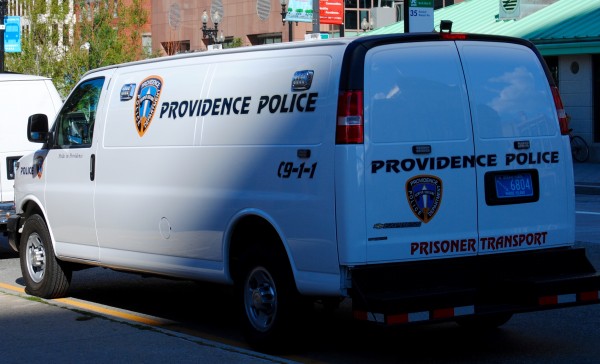 The police were in fact ready with plastic handcuffs hanging from their belts and two “paddy wagons” parked on the opposite side of Kennedy Plaza. During the protest the police made a large show of force that included at least one officer videotaping the crowd, for reasons that are unclear. The Providence Police are often videotaping crowds at such events, but do not seem to have any policies in place regarding the use of such video.
The police were in fact ready with plastic handcuffs hanging from their belts and two “paddy wagons” parked on the opposite side of Kennedy Plaza. During the protest the police made a large show of force that included at least one officer videotaping the crowd, for reasons that are unclear. The Providence Police are often videotaping crowds at such events, but do not seem to have any policies in place regarding the use of such video.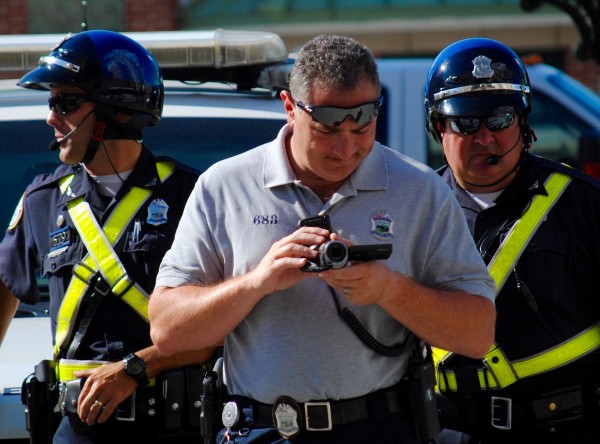 RICH drew attention to a report from the National Law Center on Homelessness and Poverty, which “details the ways in which criminalizing ordinances are damaging both to individuals experiencing homelessness and to the cities that enact them. It also found that, despite a lack of affordable housing and shelter space, cities across the country are essentially making it illegal to be homeless with laws that outlaw life-sustaining acts, such as eating and sleeping, in public spaces.”
RICH drew attention to a report from the National Law Center on Homelessness and Poverty, which “details the ways in which criminalizing ordinances are damaging both to individuals experiencing homelessness and to the cities that enact them. It also found that, despite a lack of affordable housing and shelter space, cities across the country are essentially making it illegal to be homeless with laws that outlaw life-sustaining acts, such as eating and sleeping, in public spaces.”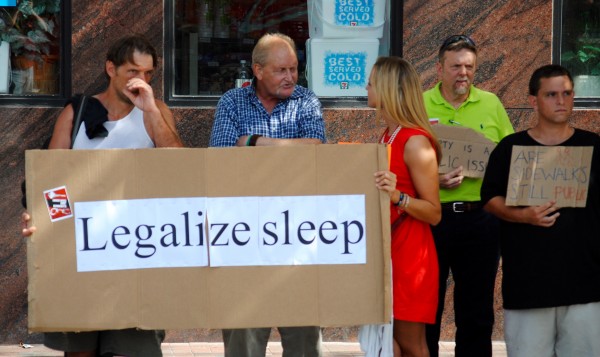 RI famously passed a “
RI famously passed a “